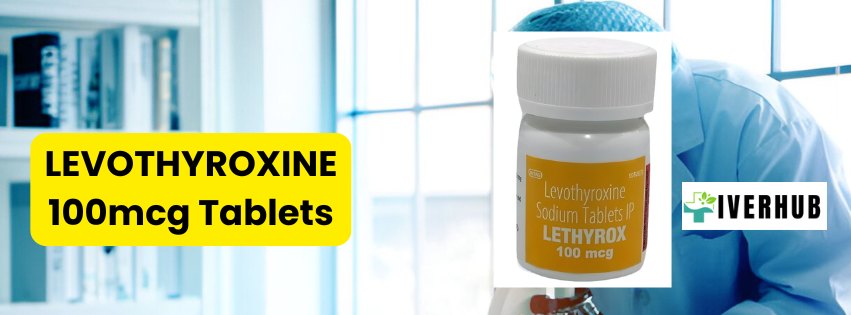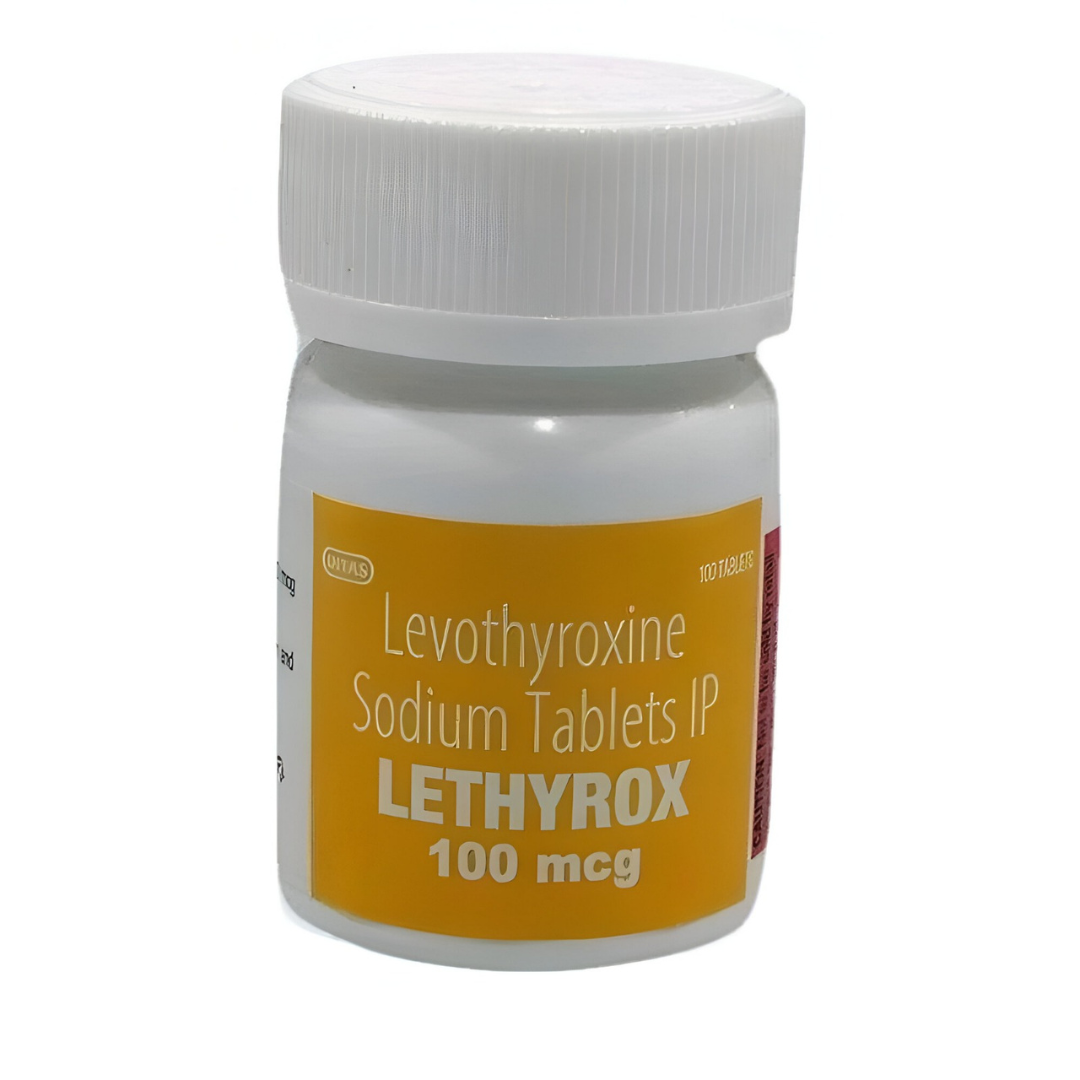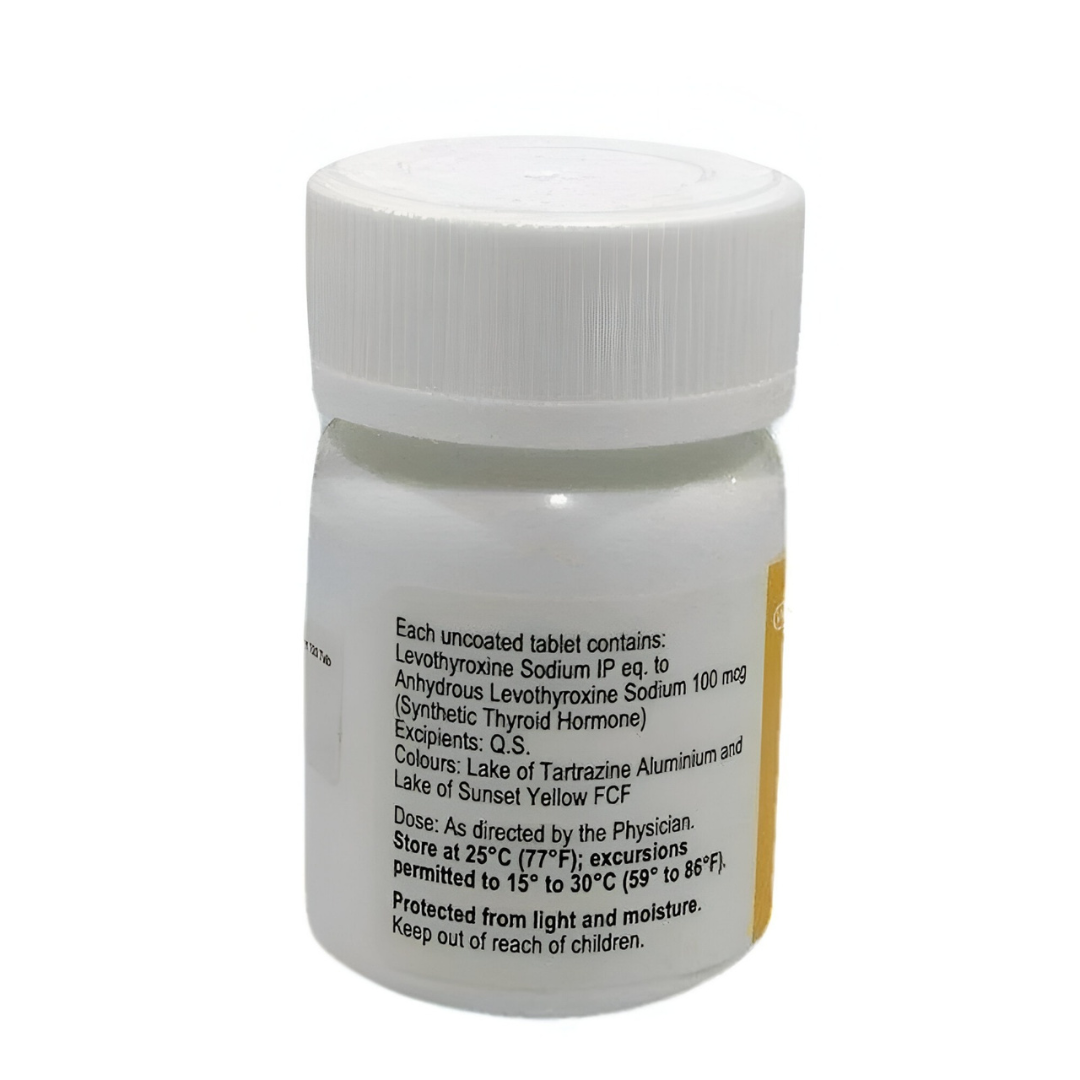- Your cart is empty
- Continue Shopping
Levothyroxine 100 mcg

Levothyroxine 100 mcg : Tyroxine (T4) is a thyroid hormone; levothyroxine is a synthetic version of the hormone. People who suffer from hypothyroidism a disorder in which the thyroid gland fails to generate enough hormones should pay close attention to this.
This drug supports healthy growth and development in children as well as the regulation of many other body processes, such as metabolism and energy production.
Many thyroid patients started to wonder if their levothyroxine treatment especially at the 100 mcg dosage might interact with their chance of contracting the virus and its side effects
when the COVID-19 pandemic broke out.

What is Levothyroxine 100 mcg ?
A drug called levothyroxine imitates the hormone that the thyroid gland naturally produces. It aids in keeping hormone levels in people with hypothyroidism in balance.
Levothyroxine dosages are determined by a number of criteria, including age, weight, and the severity of the patient’s disease. One of the most typical prescriptions for those who need a greater dose of thyroid hormone to sustain normal body processes is for 100 mcg.
Function of the drug
Levothyroxine enters the bloodstream aft er administration and is transformed into triiodothyronine (T3), the active hormone.
Among the many biological processes that T3 controls are:
● Metabolic process:
The body can burn more calories and produce more energy when the metabolic rate is raised.
● Extension and Progression:
For healthy growth and cognitive development in children, thyroid hormones are crucial.
● Retaining Body Temperature:
Through a variety of activities and settings, hormones assist in controlling body temperature.
Patients who use levothyroxine can avoid hypothyroidism symptoms including depression, weight gain, and fatigue by maintaining normal hormone levels in their bodies.
Thyroid Function and COVID-19
Demonstrated that the SARS-CoV-2 virus, which causes COVID-19, affects the endocrine system in a number of ways. This encompasses impacts on the thyroid gland, which may result in immediate as well as long-term issues.
Research suggests that thyroid dysfunction affects 15–30% of COVID-19 hospitalized patients.
The intricate connection between COVID-19 and thyroid function can take
many different forms:
1. Non-Thyroidal Illness Syndrome (NTIS):
Thyroid hormone levels (particularly T3) are low in this syndrome, which is frequently brought on by a severe illness and occurs in the absence of underlying thyroid disease.
2. Increased Risk of Thyroiditis:
COVID-19 has been linked to thyroid inflammation (thyroiditis) in certain people, which might aggravate pre-existing thyroid disorders.
3. Autoimmune Reactions:
COVID-19 can set off autoimmune reactions that impact thyroid function, especially in people who are prone to autoimmune disorders.
COVID-19 and the drug Regarding levothyroxine, especially when taken at a dose of 100 mcg, the main worries for those using it are whether or not their therapy would
affect how they respond to COVID-19.
Key factors:
1.COVID-19 and hormone levels:
According to research, persons with COVID-19 who have low serum levels of triiodothyronine (T3) and thyroxine (T4) had greater rates of mortality and severity.
Therefore, maintaining steady thyroid hormone levels during such infections may depend on levothyroxine.
2. Chance of Thyroid Problems:
Thyroid impairment that is transient has been noted in certain patients receiving levothyroxine during COVID-19. But as most studies have shown, this is reversible.
3. Handling the Contamination:
When a patient has a COVID-19 infection, they should continue taking levothyroxine as directed by their doctor because quitting hormone replacement therapy can result in serious health concerns from uncontrolled hypothyroidism.
The Significance of Observation
Levothyroxine users need to be regularly watched, especially if they have COVID-19. Thyroid hormone levels (FT3, FT4, and TSH) must be checked regularly in the lab to make sure they stay within optimal ranges.
Things to be aware of:
Signs of hypothyroidism include:
Hormone levels that are too low may be indicated by fatigue, weight gain, cold intolerance, and hair loss.
Signs of an overactive thyroid:
Conversely, signs such as elevated heart rate, anxiety, and loss of weight could indicate an overabundance of thyroid hormone.
Interaction with Doctor :
Those taking levothyroxine should communicate with their healthcare team at all times, especially during the COVID-19 epidemic.
Notifying them of any fresh symptoms or issues can assist in adjusting their
treatment plan appropriately.

Conclusion: Levothyroxine 100 mcg
In order to effectively manage hypothyroidism, levothyroxine 100 mcg is needed. This is especially true given the ongoing COVID-19 pandemic.
Patients can successfully navigate their health despite possible risks if they receive the right care and supervision.
For levothyroxine users, the most important thing to remember is to follow their doctor’s instructions exactly and to let them know if their condition changes.
All things considered, although COVID-19 may present more difficulties for people with thyroid disorders, prompt treatment can support preserving health and wellbeing.
FAQs: Levothyroxine 100 mcg
1. What is the purpose of Levothyroxine 100 mcg?
A drug called levothyroxine 100 mcg is used to treat hypothyroidism, a disorder in which the thyroid gland fails to generate enough thyroid hormone.
This drug supports a number of body functions by assisting in
the normalization of hormone levels.
2. Should I keep taking levothyroxine in the event of a COVID-19 pandemic?
Ask duty Doctors who was taking care of COVID 19 patients.
3. Can the thyroid function be affected by COVID-19?
Research suggests that COVID-19 may interfere with thyroid activity.
4. Is there an increased risk of COVID-19 in people with thyroid disorders?
Based on available data, individuals with properly treated hypo- or hyperthyroidism are not more likely than the general population to get COVID-19.
5. How may COVID-19 affect the thyroid illness prognosis?
Patients who already have thyroid issues may experience complications as a result of COVID-19’s impact on thyroid function. Both throughout the illness and the healing process, abnormal thyroid function has been observed.
6. How does thyroid dysfunction manifest in COVID-19 patients?
Weariness, fluctuations in weight, and mood swings are among symptoms. In severe circumstances, patients may show symptoms of non-thyroidism in syndrome (NTIS), in which there is an imbalance in thyroid hormone levels even in the absence of prior thyroid disease.
7. Should I check my thyroid levels more oft en when COVID-19 is in
effect?
Regarding how oft en to check thyroid levels, patients should speak with their doctor, especially if they are exhibiting signs of COVID-19 or thyroid dysfunction.
8. Can levothyroxine users’ thyroid function be affected by COVID-19 vaccinations?
While strong evidence and processes are still being investigated, several publications speculate that thyroid problems may develop after immunization.
Patients should continue taking their medication and be
watchful.
9.What should I do if I forget to take my levothyroxine dose?
Take your levothyroxine dosage as soon as you remember if you miss one. But if your next dose is almost here, then go ahead and take the missing one and get back to your regular schedule. Don’t ever take two dosages at once.
10. Do those using levothyroxine during COVID-19 need to follow any
special dietary guidelines?
Sure, a few foods and substances may prevent your body from absorbing
levothyroxine.
11. In light of COVID-19, are there any hazards connected to levothyroxine overdose?
Adverse effects like anxiousness and a fast heartbeat are indeed possible with an overdose. This can make managing any condition, including COVID-19, more difficult, but immediate medical intervention is required in them.
12. How do therapies for COVID-19 and levothyroxine interact?
It is recommended that individuals disclose all medications they take to their healthcare provider, even in the absence of specific proof of direct interactions between levothyroxine and COVID-19 therapies.
13. Is it crucial for people receiving levothyroxine during COVID-19 to exercise regularly?
Yes, sticking to a regular exercise schedule helps enhance immune system function and general wellness. Nonetheless, patients should adjust their degree of exercise in accordance with their health, particularly when they are recovering from COVID-19.
Shop Now: LEVOTHYROXINE 100mcg Tablets

